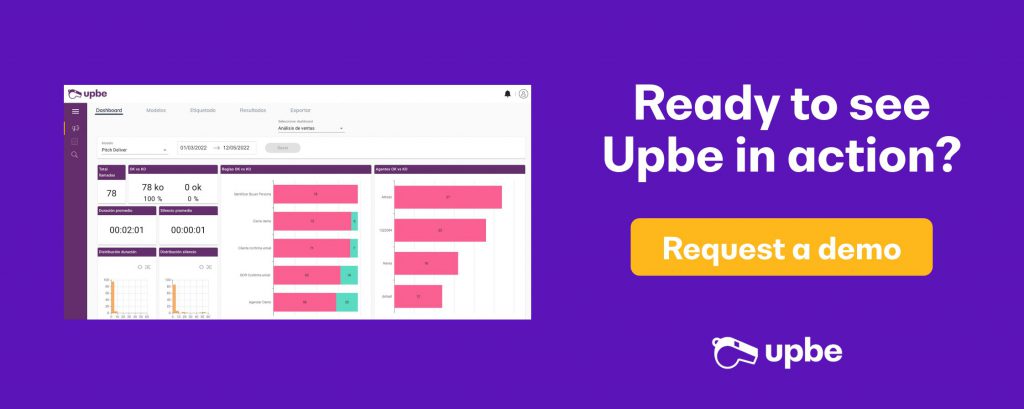
Effective debt management is a vital cog in the financial machinery of any business, whose function is to ensure the receipt of payments for products or services, thus sustaining cash flow. Failing to address overdue or unpaid accounts receivable in a timely manner can trigger financial difficulties, compromising the payment of bills, the capitalization of growth opportunities, and the fulfillment of financial obligations. Therefore, collection teams and their respective debt recovery calls have strategic relevance, by promoting timely payments, managing risks, forging positive relationships with customers, and providing crucial information for financial management and decision-making.
That said, the success of these debt recovery efforts largely depends on the effectiveness of phone calls. Beyond complying with the law, it is the tone, timing, and framework of the conversation that can define the success or failure of the call.
But, how is this communication characterized? What tone and what kind of relationship should be established with the customer? In the following article, we will break down some key strategies that can help optimize your collection skills and increase the effectiveness of your debt recovery calls.
Strategies to improve debt collection calls
Here we will provide tips for successful management of debt collection calls:
Act proactively
Taking a proactive follow-up approach after providing the service or before the payment due date can prevent delinquency, helping to maintain a positive relationship with clients. This approach requires being well-prepared and having all relevant information at hand, such as customer details, product or service, outstanding invoices, terms and conditions of payment, and payment history.
Automation can facilitate the adoption of a proactive approach in collection management, allowing you to prioritize high-risk clients with payment predictions and aging analysis, which enables data-based segmentation and personalization of collection strategies.
Prepare the conversation
Before making a collection call, it is essential to prepare adequately, making note of key topics to keep the conversation focused and redirect it if it deviates. Also, you should have all the relevant information about the client and the debt at hand, including all corresponding invoices, to increase the chances of success in collection calls.
During the calls, it is imperative to obtain concrete results and define clear actions, which involves seeking essential information such as the expected payment date, confirming outstanding invoices, and understanding what documents the client needs to make payments. To avoid confusion and repetition of information, it is crucial to collect all relevant information and resolve any misunderstandings during the call, rather than trying to resume communication with the client later.
Collect all possible information
In the debt collection process, it’s essential to carry out meticulous documentation that includes details such as the date and time of the call, the estimated payment date, the actions required, and the agreements reached. Constant management and updating of the client’s contact information are vital as they optimize debt recovery and facilitate the transition to self-service processes.
You may not always obtain valid data, requiring data investigation that can be hindered by lack of systems integration and restrictive policies. Automation is key to this data recovery. Although it can be an error-prone process, adopting advanced technologies like AI can help centralize and automate this information in real time, freeing the team to focus on recovery strategies for high-risk clients.
Don’t rush
Being a good listener is crucial during a debt collection call, listening to what the client has to say after concisely conveying our message, albeit without surrendering control of the call. It’s essential to confirm if the debt has not been paid before initiating the collection process, to avoid alienating a good client due to a possible error or lack of communication.
Instead of adopting an aggressive attitude, it’s more useful to have patience and understand the reasons for the client’s payment delays, which implies asking open-ended questions and deeply analyzing the problems. Automation and artificial intelligence can overcome the challenge of lacking full visibility of the client’s data, providing insights that facilitate data-driven decision-making and improve collection outcomes.
Maintain professionalism
During collection calls, it’s essential to maintain a positive and controlled tone to get better responses from clients and meet business needs without damaging the relationship with them. It’s crucial to respect legal regulations and best debt collection practices, always maintaining courtesy and professionalism to protect the company’s reputation.
Keeping calm in the face of an angry client is essential to avoid deviating from the goal of the collection call. How something is said can be as crucial as the content of the message, making an appropriate tone of voice and the strategic use of pauses indispensable for effective communication.
Be empathetic
Empathy is an essential tool in debt collection as it helps maintain healthy relationships with clients. Showing empathy, which includes educating clients about their bills, interacting with them in a respectful manner, and carefully listening to them, can prevent misunderstandings and avoid defensive reactions.
In addition, by avoiding arguments and anticipating what to say appropriately, it’s possible to guide the conversation towards solutions that benefit both parties and prevent the loss of clients and long-term revenue. This approach fosters an environment of trust and respect, facilitates conversations, and improves client satisfaction, thereby optimizing accounts receivable.
Conclude successfully
During the debt collection process, it’s helpful to suggest flexible payment options, such as installment payments, to make it easier for the debtor to settle their accounts.
It’s crucial to get a payment commitment from the client, whether partial, full, or on a specific date, to ensure the success of the collection call.
Before ending the call, you should summarize the entire conversation to the debtor, including details on how and when the payment will be made, and depending on the payment method, a confirmation of the payment made should be requested.
Keep the interaction open
Keeping the conversation open with someone who can’t pay immediately can generate possibilities for future payment. Plus, you can assist the client in looking for ways to get the money without incurring high interest. This approach allows you to continue with the negotiation while maintaining a good relationship with the client.
Follow up
A call to a client is incomplete without adequate follow-up. Follow-up serves as a reminder for your client, keeps the communication channel open for future discussions, educates the client about the consequences of not being able to pay, and helps identify the necessary next steps to get the payment, like helping the client choose the right payment option.
Automating follow-up through emails simplifies this process and avoids manually writing thousands of emails daily. Artificial intelligence helps identify the client’s intention, like the commitment to pay or sending an invoice.
Facilitate self-service
Despite having valid contact data, situations may arise where it is difficult to communicate with some clients. These clients should be excluded from standard processing and assigned to a no-contact strategy, in which the cause of failed contact attempts is evaluated and solved. To maintain effective communication, it is recommended to periodically change the communication channel.
Evaluate communication
In every interaction with the client, the result should be evaluated and recorded, and if faults are detected, corrective measures should be taken. Addressing these problems from the first incident improves the chances of maintaining communication with clients through other channels.
In addition, all activities should follow a structured process, be recorded, and monitored to improve efficiency and effectiveness, optimize data quality, understand which strategies are most effective for what type of client, and perfect research efforts over time.
Enhance collection calls with AI
As we mentioned earlier, debt collection is a task that can present complications. Clients have unique financial situations and emotional responses, and despite the most careful efforts and skills of collection agents, the results are not always as anticipated. In such contexts, being empathetic and proposing customer-adapted payment plans is a sensible practice, but on its own, it may not be enough.
Negotiation and communication tactics are vital, but in today’s digital age, so is adopting appropriate technology to improve and speed up the collection process. Automated communication tools, such as messages and emails, and automatic dialing can increase productivity and improve connection rates with clients. App-based and web payment options simplify, speed up, and ensure the security of the payment process, improving the customer experience and the effectiveness of collection.
In addition, by adding the use of artificial intelligence and machine learning, valuable patterns and trends can be identified. Software like Upbe, based on these technologies, automate tasks, collect and analyze data, and record conversations, being vital to analyze the quality of the call center. These programs allow real-time tracking of key performance indicators (KPIs), generating automatic reports for call center managers.
It is a proven fact that this type of technology can have a significant positive impact on collection operations, as demonstrated by our experience with a client who saw an 8% increase in their recovery rate. If you’re ready to take your call center to the next level of efficiency and success, don’t hesitate to explore the solutions that Upbe can offer your business.

How to improve the quality of calls in a call center?
To improve the quality of calls in a call center, especially for debt recovery purposes, it is crucial to gather relevant information, practice empathy, maintain professionalism, offer flexible payment options, and follow up after the call. Additionally, adopting suitable technology such as automated communication tools and artificial intelligence can increase productivity and effectiveness in debt collection.
Controlling the quality of customer service in a call center involves meticulous call information collection, proper training of staff to understand products and services, and fostering empathy and professionalism in customer interactions. It is vital to utilize technology, such as artificial intelligence and automation tools, to optimize operations and monitor customer service performance. Ongoing monitoring and promoting self-service options for customers are also effective strategies.
Call quality refers to various factors that contribute to an effective and satisfactory interaction between a call center agent and a customer. It includes proper call preparation, with the agent being well-informed about the customer and their situation. Communication should be clear, focused, and professional, allowing the customer to express their concerns while the agent maintains control of the conversation. Empathy also plays a key role, showing understanding towards the customer’s situation. The call should result in clear actions, with accurate information gathered and appropriate follow-up.
A quality assessment in a call center is a process that involves the systematic analysis of agent-customer interactions to improve agent performance and customer satisfaction. It includes reviewing call recordings, observing real-time interactions, reviewing customer data, and gathering customer feedback. The assessment results are used to provide feedback to agents, identify areas for improvement, and adjust call center policies. Technologies such as artificial intelligence can support this process by analyzing calls, identifying patterns, and automating parts of the evaluation process.


